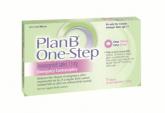The Obama administration plans to appeal a federal court ruling that makes levonorgestrel-based emergency contraception available to all without a prescription.
On May 1, the U.S. Justice Department sent a letter to Judge Edward Korman of the Eastern District of New York advising him of the plan to appeal and seeking to halt implementation of his April 5 ruling, pending the appeal’s outcome. In the April 5 decision, Judge Korman ordered the federal government to lift all age restrictions on emergency contraceptives within 30 days.
The news from the Justice Department came just a day after the Food and Drug Administration approved Plan B One-Step (levonorgestrel tablet, 1.5-mg, for oral use) without a prescription for young women aged 15-16 years, provided they can verify their age. Previously, the emergency contraceptive was available over the counter only to women aged 17 years and older.
Although the FDA approval of Plan B One-Step was not related to Judge Korman’s ruling, it means that all of the plaintiffs in the original lawsuit (Tummino v. Hamburg) would have access to emergency contraception without a prescription, Lorette E. Lynch, U.S. Attorney for the Eastern District of New York, wrote in a letter to Judge Korman.
But the availability of Plan B One-Step to more adolescents was not enough to stop many physician groups from blasting the plan to appeal. The American Academy of Pediatrics, the American College of Obstetricians and Gynecologists, and the Society for Adolescent Health and Medicine all came out against the Justice Department’s position.
"The Justice Department’s decision defies the medical community’s consensus opinion that emergency contraception is completely safe and effective for young women of any reproductive age," Dr. Thomas K. McInerny, president of the American Academy of Pediatrics, said in a statement. "Nearly 80% of pregnancies in adolescents are unintended, and if the administration’s appeal is successful, not all adolescents will be able to easily access a product that can prevent unintended pregnancies and protect their health."
And the organizations said that the FDA’s move to approve Plan B One-Step for young women aged 15 years and older was only a small step forward. There may also be problems with implementing the new policy since 15-year-olds often don’t have identification that would provide proof of age, they said.
Under the approval issued by the FDA on April 30, Plan B One-Step will be packaged with a product code prompting a cashier to request and verify the customer’s age. A customer who cannot provide age verification will not be able to purchase the product, according to the FDA announcement. The product will be available in the family planning or women’s health aisles of stores that have a pharmacy and will be accessible "whether the pharmacy is open or not," the FDA statement said.
There are also concerns that the age restrictions will create confusion, especially since Plan B One-Step and the original Plan B now have different age requirements for OTC access, in addition to different dosing schedules. Access to the original Plan B remains limited to women aged 17 years and older without a prescription. There’s also a third emergency contraceptive on the market – Ella – which is available only be prescription.
"Confusion usually winds up reducing access" as pharmacists, unsure of the rules, err on the side of caution, said Dr. Eve Espey of the department of obstetrics and gynecology at the University of New Mexico, Albuquerque.
But it’s important to remember that, overall, "access to emergency contraception is being liberalized and hopefully will continue to get easier for women. Talking to women about emergency contraception and continuing to advocate for increased access [both] remain really important," she said.
Dr. Espey said that she had no financial conflicts of interest.
mschneider@frontlinemedcom.com
